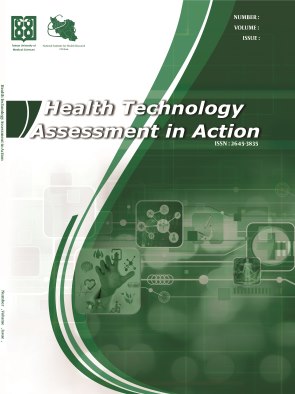Translation and Validation of a Persian Version of the Mindfulness in Parenting Questionnaire: P-MIPQ
Abstract
Background: Parenting is an important issue in the growth process of children that affects their health. A new approach in parenting styles is mindful parenting. Mindfulness in parenting means taking care of children with no judgmental approach and having an open welcoming attitude toward children’s actions at the very moment the parents and offspring(s) are living.
Objectives: This study aimed to localize the Mindfulness in Parenting Questionnaire (MIPQ) into the Persian language through translation and validation to create a useful valid measure for assessing mindfulness in parenting in Iran.
Methods: The MIPQ original version was translated through forward-backward translation into Persian, and then was pilot-tested on mothers of children aged 7 - 12 after confirming the validity of the measure using the CVR-CVI method. Confirmatory factor analysis was used to ensure the item development validity of the measure. To evaluate the factor structure of data, AMOSE (version 24) software was used. To assess the reliability of the translated version, 15 mothers were included in the first phase of the study. They filled out the MIPQ, and also simultaneously filled out the Parenting Scale by Arnold and O’leary 1993 and MMAS by Brown and Ryan 2003. After having the measure confirmed regarding validity and reliability, it was distributed to 400 mothers of whom, 306 returned the questionnaire fully administered.
Results: Confirmatory factor analysis indicated that the two-factor model in the original measure was of good fit. The total score of the questionnaire and the scores of the two domains (‘Mindfulness’ and ‘Being in the moment with the child’) were correlated significantly and positively with the total score of the MAAS and PS. The CVR-CVI of the questionnaire was also confirmed.
Conclusions: Regarding the psychometrics of the measure, according to the results of our study, it seems that the questionnaire benefits from a high standard structure and content, as well. As one could notice, this study is the second effort for translation and validation of MIPQ, in both of which the measure could meet the criteria’s requirements. Therefore, it seems that the measure could be a useful standard questionnaire for evaluating mindfulness in parenting. More research is needed to evaluate the effectiveness of the measure (P-MIPQ) in different people.
2. Parent J, McKee LG, Anton M, Gonzalez M, Jones DJ, Forehand R. Mindfulness in parenting and coparenting. Mindfulness. 2016;7(2):504-13.
3. Aunola K, Stattin H, Nurmi J-E. Parenting styles and adolescents' achievement strategies. Journal of adolescence. 2000;23(2):205-22.
4. Baumrind D. The influence of parenting style on adolescent competence and substance use. The journal of early adolescence. 1991;11(1):56-95.
5. Perris C, Arrindell WA, Eisemann M. Parenting and psychopathology: Wiley; 1994.
6. Power TG. Parenting dimensions and styles: a brief history and recommendations for future research. Childhood Obesity. 2013;9(s1):S-14-S-21.
7. Bögels SM, Lehtonen A, Restifo K. Mindful parenting in mental health care. Mindfulness. 2010;1(2):107-20.
8. McCaffrey S, Reitman D, Black R. Mindfulness in Parenting Questionnaire (MIPQ): Development and validation of a measure of mindful parenting. Mindfulness. 2017;8(1):232-46.
9. Duncan LG, Coatsworth JD, Gayles JG, Geier MH, Greenberg MT. Can mindful parenting be observed? Relations between observational ratings of mother–youth interactions and mothers’ self-report of mindful parenting. Journal of Family Psychology. 2015;29(2):276.
10. Duncan LG. Assessment of mindful parenting among parents of early adolescents: Development and validation of the Interpersonal Mindfulness in Parenting scale. 2007.
11. Wu L, Buchanan H, Zhao Y, Wang P, Zhan Z, Zhao B, et al. Translation and Validation of a Chinese Version of the Mindfulness in Parenting Questionnaire (MIPQ). Frontiers in psychology. 2019;10:1847.
12. Nunnally JC, Bernstein I. Psychometric theory. New York: MacGraw-Hill. _ d. Intentar embellecer nuestras ciudades y también las. 1978.
13. Hu Lt, Bentler PM. Cutoff criteria for fit indexes in covariance structure analysis: Conventional criteria versus new alternatives. Structural equation modeling: a multidisciplinary journal. 1999;6(1):1-55.
14. Marsh HW, Grayson D. Latent variable models of multitrait-multimethod data. Structural equation modeling: Concepts, issues, and applications. Thousand Oaks, CA, US: Sage Publications, Inc; 1995. p. 177-98.
15. Arnold DS, O'leary SG, Wolff LS, Acker MM. The Parenting Scale: a measure of dysfunctional parenting in discipline situations. Psychological assessment. 1993;5(2):137.
16. Brown KW, Ryan RM. The benefits of being present: mindfulness and its role in psychological well-being. Journal of personality and social psychology. 2003;84(4):822.
17. Lawshe CH. A quantitative approach to content validity. Personnel psychology. 1975;28(4):563-75.
| Files | ||
| Issue | Vol 4, No 3 (2020) | |
| Section | Articles | |
| DOI | https://doi.org/10.18502/htaa.v4i3.6348 | |
| Keywords | ||
| Mindfulness Parenting Validity Reliability Iran | ||
| Rights and permissions | |

|
This work is licensed under a Creative Commons Attribution-NonCommercial 4.0 International License. |




